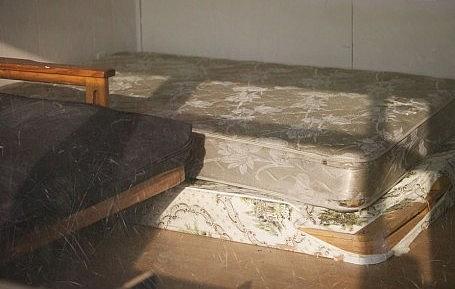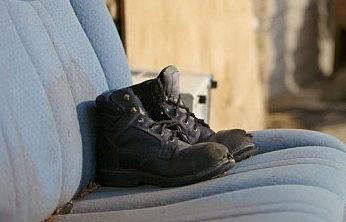Cherry Orchard: An incomplete victory
The living conditions for migrant workers and their families in the apartment complex Cherry Orchard Village in Rantoul, Ill., were able to stir even the most hardened stomach. Sewage flooded the area where buildings were erected.
Although several agencies had worked individually to try to improve the situation, it took a visit in December 2009 by Julie Pryde, Public Health Administrator for Champaign-Urbana to begin a collective approach towards addressing substandard conditions.
In many ways, they succeeded.


The living conditions for migrant workers and their families in the apartment complex Cherry Orchard Village in Rantoul, Ill., were able to stir even the most hardened stomach.
Sewage flooded the area where buildings were erected.
There were holes in the windows that allow one to see and feel the snow on the outside of buildings. There was no heat or electricity. People heated their homes by leaving open the oven door.
There was no water, which had been the case for a month, according to rumors.
There were loose electrical wires and no smoke or carbon dioxide detectors in sight.
Although several agencies had worked individually to try to improve the situation, it took a visit in December 2009 by Julie Pryde, Public Health Administrator for Champaign-Urbana to begin a collective approach towards addressing substandard conditions.
In many ways, they succeeded.
Working together, a diverse group of public agencies, nonprofit organizations and religious institutions, they moved residents into apartments with better conditions. They provided food to migrants and enrolled their children in are schools.
In addition, through the courts, they managed to close the apartment complex.
Administrators, Eduardo Ramos and his son Bernardo Ramos, were fined $54,000. Bernardo Ramos was arrested in Washington, DC in April 2011.
"It was a collaborative effort to help a bad situation," said Andy Kulczycki, executive director of Community Service Center of Northern Champaign County.
This collaboration represents a marked contrast to the response and action from the federal government to even more terrible worker conditions in Wright County Egg in Galt, Iowa, which in 2010 became the epicenter of the largest removal of eggs from the market in the nation's history.
But while some consider the local effort as a new way to protect and improve community health in predominantly Latino migrants who venture north each year to work on crops in the area, others have said it only showed the limited impact this type of intervention can have. A Migrant Labor Camp Law, ineffective and difficult to observe in an inefficient system; jurisdictional issues; and the major issues of wages and working conditions of immigrants, were not affected by this development, some believe.
"They have been oppressed labor since the days of slavery," said Miguel Keberlein, a lawyer for the Legal Assistance Foundation of Metropolitan Chicago who has worked for more than a dozen years in legal issues related to migrants. "They are the remnants of slavery."
The process
After his visit to departments in December 2009, Pryde wrote an email to the people who worked with the migrant community in the area.
It said in part:
"As many of you know, Cherry Orchard Apartments, located south of Rantoul, has no legal or functional septic system. The apartment complex also has other flaws that threaten the security of its inhabitants as the lack of running water or electricity used by their inhabitants come from neighboring buildings through extension cord, and other issues ...
"I would like to get together to discuss possible options to residents in Cherry Orchard. CUPHD is willing to take the lead in this situation. We are ready to interview the residents and work with them to find alternative housing. The goal of the meeting is to find ideas that can facilitate this. Also we can discuss the current situation to avoid a repeat in the future."
Residents and area agencies responded to the call and got to work.
The effort, largely local, involving many different entities, according to Elizabeth Tyler, director of community development in the city of Urbana. Enlisted officers of cities and towns in Urbana and Rantoul, members of the county board, defenders of the Latino community, several social service agencies and area school districts, among others.
The group went on to discuss possible options to supply the residents of Cherry Orchard food and decent housing for families and schooling for children.
Based on previous experience, Pryde said she wanted to prevent people from being evicted without better alternatives.
Tyler said a county group had created a fund to assist migrants with the cost of rent for now and in the future with the connections from their own departments.
The effort seemed to have paid off until Ramos moved to a second group of workers into the complex.
The odyssey began again, with the additional element of legal action taken against Ramos for the septic system.
Keberlein explained that the septic tank was an element that justified the closure of the complex.
"Each of us were trying to do it our way," he said. "The septic tank leak was an excuse to close the place. The biggest problem in these places where there is poor housing neighborhood leaders is to find a legal way to close the complex, "he said. "You introduce a single customer name and usually get money to compensate the damage to this unique client. You do not get an injunction to close the place. The septic tank affects everyone. "
The tank was just one of many health problems the migrants faced, Keberlein said.
Some of the most important: the high rates of injury, exposure to pesticides, poor diet, and working conditions that prevented workers from having time to see a doctor.
"All this affects the health of a family of farm workers," he said. "The irony is that people who grow and harvest food, they can not afford to eat."
In April 2011, John Kennedy, Champaign County judge fined Ramos $54,000 and ordered him to close the property.
But many residents stayed behind, which made Pryde and sheriff's deputies, accompanied by a translator, have to go door to door in July 2011 to inform the tenants who had to leave the complex.
Looking to the future
Opinions were divided about what was achieved with the closure of Cherry Orchard.
Tyler, Urbana, said the action had several positive results:
"It put the issue in the spotlight and brought out some weaknesses in our structure and legislation that could not be ignored. It was important to detect problems in the code and to show that these things happen in our community, [and] that children are living in dangerous conditions. "
One of the men responsible for the conditions in Cherry Orchard, is free again because of legal error.
Bernard Ramos, who along with his father Eduardo Ramos, was vigilant in Cherry Orchard, was released after the period of his extradition from Washington, D.C., because it was handled improperly, according to the Champaign News-Gazette.
Joel Fletcher, assistant state attorney Champaign County, who was in charge of extradition, told the News-Gazette that the case should have been handled as a federal extradition, and instead was processed as an interstate extradition.
Fletcher could not be contacted by Hoy.
For his part, Keberlein called the Migrant Labor Camp Law inefficient, arguing that federal law permits a violation of $500 a year. More generally, he said it is unlikely that workers living in communities for limited periods have knowledge about their rights to present a legal remedy. And those who are willing to do so face obstacles in trying to get paid their fair share.
"At the end of the day, you have to be able to collect," he said, noting that in one case, the person who administered the complex had filed for bankruptcy. "It's hard to chase the money."
Beyond the compound in question, some wondered how much had changed the conditions for workers.
"All we did was move people from Cherry Orchard," said Pryde. "We closed it, and we address the problem of public health represented by the drainage that flooded the field, but by no means solved the problem."
"We closed Cherry Orchard, but that does not mean that there are no Cherry Orchards in other places."
This story was originally published in http://www.vivelohoy.com/.

